Share
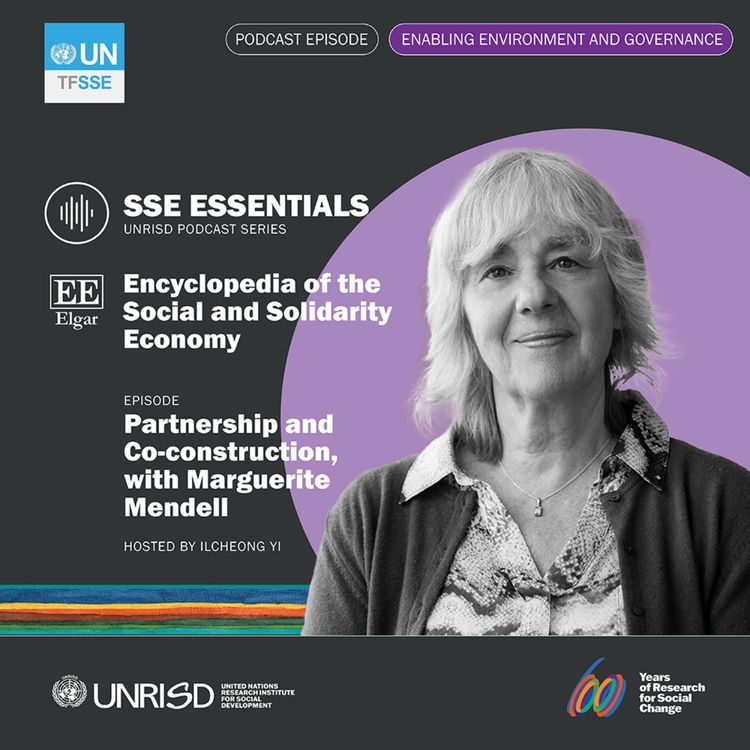
UNRISD Podcasts
Partnership and Co-construction, with Marguerite Mendell
Season 1, Ep. 1
•
This episode explores Marguerite—Margie—Mendell’s work at the Karl Polanyi Institute around the Social and Solidarity Economy (SSE), as a camp and practice recently recognized by the United Nations in a 2023 General Assembly resolution. We hear from Margie herself about alternative economies as an ever-evolving field, key academic influences in her remarkable trajectory as well as stories of transformation of communities in Montreal and paradigmatic examples of local economic development. The author then introduces three urgent challenges to realize the vision and promises of the SSE as a transformative force, intellectually and on the ground.
To read the encyclopedia’s entry on partnership and co-construction, click here.
More episodes
View all episodes
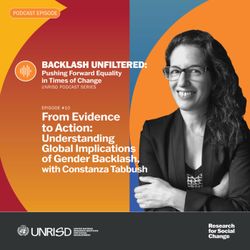
10. From Evidence to Action: Understanding Global Implications of Gender Backlash
28:40||Season 1, Ep. 10UNRISD Director Magdalena Sepúlveda sits down with UN Women Research Specialist Constanza Tabbush, the main author of the joint UNRISD–UN Women report Understanding Backlash Against Gender Equality: Evidence, Trends and Policy Responses. They unpack the key findings of this landmark global analysis, exploring how backlash unfolds across regions, its implications for human rights, and what effective policy responses look like. From rising anti-gender movements to strategic approaches that strengthen democratic resilience, Constanza and Magdalena offer insight into why understanding backlash is critical to advancing gender justice today. This episode brings listeners evidence and reflection at a moment when equality gains are under strain but collective responses are growing.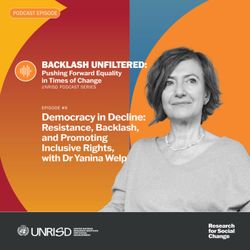
9. Democracy in Decline: Resistance, Backlash, and Promoting Inclusive Rights, with Dr Yanina Welp
25:10||Season 1, Ep. 9Democratic values are under threat across the globe. Rising authoritarianism, nationalist movements, and coordinated attacks on human rights have fueled a backlash against women, LGBTQIA+ communities, migrant communities, economically marginalized groups, and beyond.In this episode, we are joined by Dr. Yanina Welp, Research Fellow at the Albert Hirschman Centre on Democracy, to explore the challenges facing democracy today. We explore how democratic decline intersects with rollbacks on rights, and how activists, organizations, and everyday citizens are pushing back. Dr. Welp unpacks emerging forms of civic engagement and the relationship between social and institutional change. We also consider real life examples from different parts of the world, in particular Chile, where movements have fought to reclaim democratic space. Tune in for a critical discussion on defending democracy and building a more inclusive future.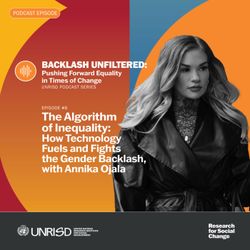
8. The Algorithm of Inequality: How Technology Fuels and Fights the Gender Backlash, with Annika Ojala
25:19||Season 1, Ep. 8Technology is transforming our world—and with it, the fight for equality. In this episode of Backlash Unfiltered, activist and global speaker Annika Ojala joins Karima Cherif (UNRISD) to explore how digital tools can both challenge and change gender inequalities. From tackling AI bias and online harassment to advancing inclusive design and feminist innovation, we look at how technology can become a powerful catalyst for empowerment. Tune in to discover how we can shape a more equitable digital future together.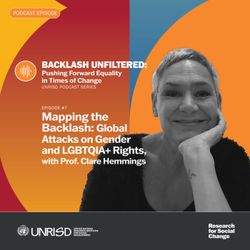
7. Mapping the Backlash: Global Attacks on Gender and LGBTQIA+ Rights, with Prof Clare Hemmings
21:55||Season 1, Ep. 7Across the globe, women’s and LGBTQIA+ rights are facing a coordinated backlash, but this resistance manifests in different ways depending on regional, cultural, and political contexts. In this episode, we are joined by Clare Hemmings, Professor of Feminist Theory at the LSE, to unpack the complexities of this pushback—examining the rollback of legal protections, the rise of anti-gender movements, and the broader societal shifts fueling these attacks. We also explore how narratives around "gender ideology" have evolved and why they hold such power today. Most importantly, we ask: how do we resist? Join us as we delve into the global landscape of this backlash and discuss strategies for pushing forward.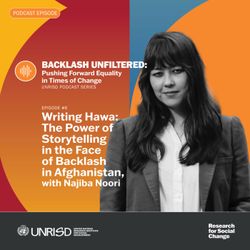
6. Writing Hawa: The Power of Storytelling in the Face of Backlash in Afghanistan, with Najiba Noori
20:41||Season 1, Ep. 6In this episode of Backlash Unfiltered, we sit down with Najiba Noori, the filmmaker behind Writing Hawa—a poignant documentary that intimately portrays the lives of three generations of Hazara women in Afghanistan. At the heart of the story is Hawa, a 52-year-old woman on a courageous journey of self-emancipation. Through her lens, we dive into the emotional, mental and spiritual toll of living under one of the most extreme forms of gender backlash and patriarchal control today. At a time when women in Afghanistan are being systematically erased, Najiba Noori’s work stands as a powerful act of resistance—amplifying voices that are marginalized and silenced. In our conversation, she shares the everyday acts of resistance that persist even in the darkest moments, and reflects on how storytelling can preserve dignity, where mainstream narratives often fall short, offering hope, and challenging dominant narratives that reduce women to victims. This episode is a powerful tribute to the resilience, courage, and hope of Afghan women—those whose strength endures, even when the world looks away. Tune in as we explore how Writing Hawa not only reclaims voice and visibility but also challenges us to rethink how we tell stories and reimagine solidarity in the face of gendered injustice. For those who’d like to learn more, you can visit www.writinghawa.com or follow the movie page on social media.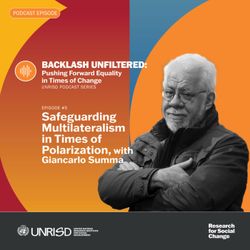
5. Safeguarding Multilateralism in Times of Polarization
24:23||Season 1, Ep. 5The multilateral system is facing its most serious crisis in 80 years. Growing nationalist and polarized movements are actively working to undermine global institutions by exploiting democratic systems, yet there is a lack of coordinated response to effectively counter these movements.In this episode, we are joined by Giancarlo Summa, researcher and former Director of the UN information centers in Brazil, Mexico, and West Africa, to explore the impact of these attacks, the motivations behind them, and the implications for international cooperation. Despite the scale of the challenge, there are ways to push back. By recognizing the threat, strengthening alliances, and adapting strategies, the multilateral system can become more resilient and continue driving global progress.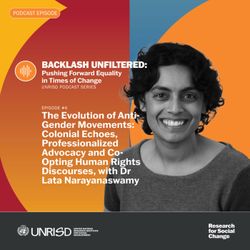
4. The Evolution of Anti-Gender Movements: Colonial Echoes, Professionalized Advocacy and Co-Opting Human Rights Discourses, with Dr Lata Narayanaswamy
24:58||Season 1, Ep. 4In this episode, Karima Cherif, UNRISD Head of Communications and Outreach, speaks with Dr. Lata Narayanaswamy, Associate Professor in the Politics of Global Development at the University of Leeds. They unpack the evolution of anti-gender movements and how they co-opt the language of human rights and development to legitimize regressive, exclusionary agendas in global policy spaces.Dr. Narayanaswamy illustrates how anti-gender actors position themselves as defenders of religious freedom and the “global South,” while simultaneously undermining gender and LGBTQIA+ rights. She discusses the sophisticated discursive strategies these movements employ—blending academic authority, institutional participation, and populist storytelling to gain influence. By tracing the colonial continuities underpinning contemporary anti-gender ideologies, this episode calls for a decolonial, justice-driven reimagining of rights and development that challenges inequality at its roots and reclaims the narrative space.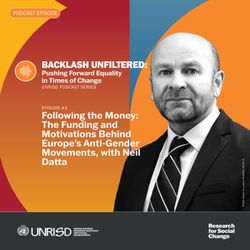
3. Following the Money: The Funding and Motivations Behind Europe’s Anti-Gender Movements
24:04||Season 1, Ep. 3Who is funding the backlash against women’s and LGBTQIA+ rights in Europe, and why? In this episode, we sit down with Neil Datta, Executive Director of the European Parliamentary Forum for Sexual and Reproductive Rights, to unpack the financial networks fueling anti-gender movements. Drawing from his groundbreaking report Tip of the Iceberg, Neil reveals the key players, funding mechanisms, and ideological motivations behind these well-coordinated efforts. We also discuss his forthcoming publication The Next Wave and explore strategies for mobilizing progressive change to push back against the rise of anti-gender and illiberal movements across Europe.Profile photo (c) Ludvík Hradilek, Deník N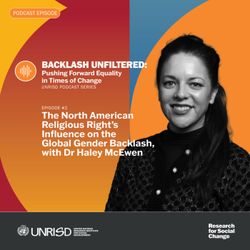
2. The North American Religious Right's Influence on the Global Gender Backlash
22:28||Season 1, Ep. 2In this episode, Anna Eknor Ackzell, UNRISD Research Analyst, speaks with Dr. Haley McEwen, postdoctoral researcher at the University of Gothenburg and Research Associate of the Wits Centre for Diversity Studies at University of the Witwatersrand, Johannesburg, whose expertise focuses on the influence of the US Christian right on global anti-gender movements. They delve into the financial and political forces driving these movements, particularly in Africa, and explore how religious-right groups mobilize against LGBTQIA+ rights, reproductive justice, and comprehensive sexuality education (CSE). Dr. McEwen provides a nuanced perspective on the role of North American funding and narratives, addressing the disproportionate financial power of anti-gender movements in comparison to progressive ones. The conversation also challenges the idea of Africa as a "homophobic continent," offering insights into the geopolitical dynamics shaping the region’s gender and sexuality politics. This episode underscores the importance of understanding these funding flows and explores resistance strategies to better navigate the global backlash in defense of gender justice.